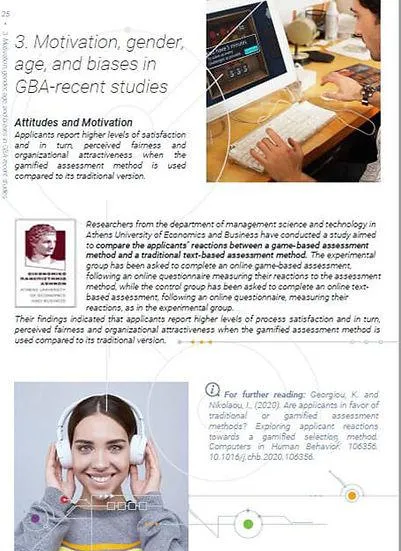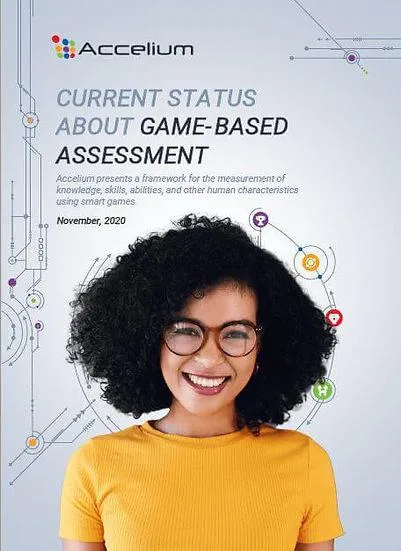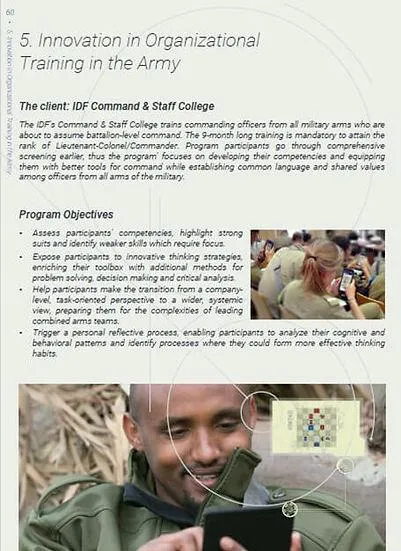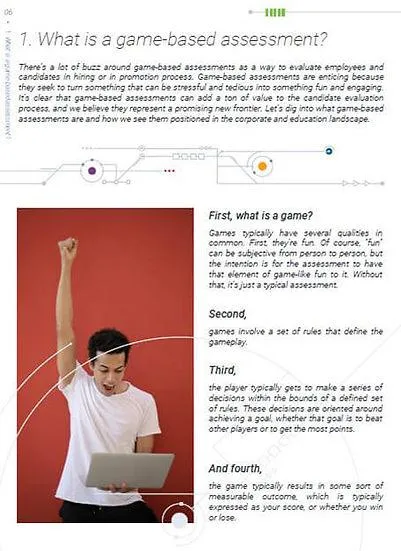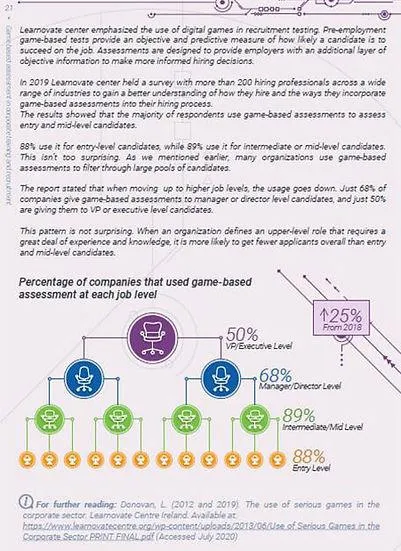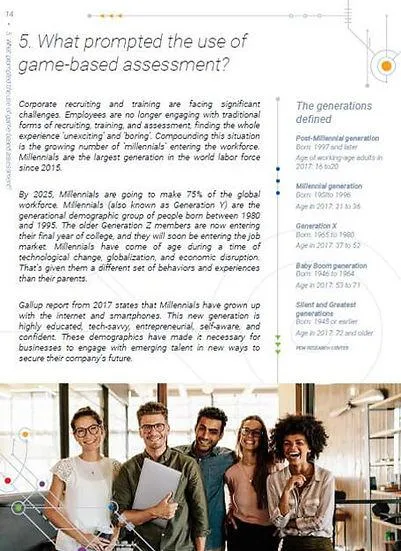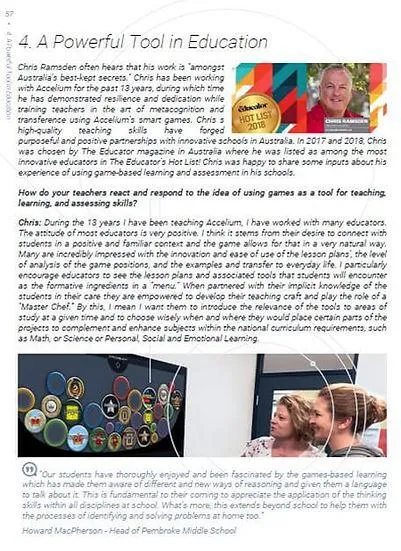
A CLEAR,
MEASURABLE EFFECT
The Research Behind the
Accelium Method
A CLEAR,
MEASURABLE EFFECT
The Research Behind the
Accelium Method
Current Status
About Game-Based Assessment
There is a growing interest in game-based assessment to measure skills performance!
Game-based assessments are attractive because they seek to turn something stressful and tedious into something fun and
engaging.
Accelium presents a framework for measuring knowledge, skills, abilities, and other human characteristics using smart
games.
Download the document to learn what game-based assessments are and how we see them in the organizational and educational landscape.
Professor Donald Green Research
The Research Behind The Accelium Method
The efficacy of the Accelium Method has been tested in a number of comparative research projects, most notably that of Professor Donald Green of Columbia University. The different projects confirm that the Accelium Method significantly improves learners' thinking abilities and life skills.
The efficacy of the Accelium Method has been tested in a number of comparative research projects, most notably that of Professor Donald Green of Columbia University. The different projects confirm that the Accelium Method significantly improves learners' thinking abilities and life skills.
In the first stage, all children played an online version of the game “Move IT". Their game performance and progress were monitored. In the second stage, children in the research group were taught abstract models for problem-solving, and their analogies to real-life situations. They were then shown how to apply these models in the games. The children in the control group simply participated freely in game-playing sessions. In the third stage, all children were taught a new game, “Ping Wins.” Both groups received identical instruction.
The results show that children in the research group significantly improved their performance levels comparing to the control group, even though the latter were allocated more time in their game-playing sessions. The remarkable fact is that even in Stage Three, the research group achieved notably higher results. In fact, the disparity between the two groups actually increased between Stages Two and Three.
The Accelium Method & Problem Solving
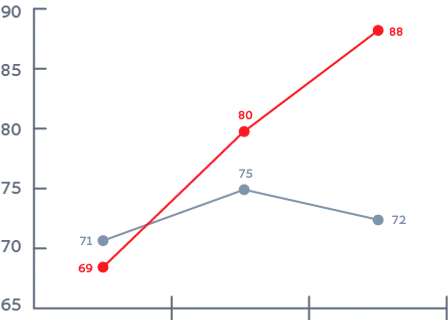
Research Group
(the Accelium Method)
Control Group
(standard methods)
The researchers concluded that:
1.Accelium's problem-solving models significantly improved children’s strategic thinking skills.
2.The children who learned Accelium's abstract models succeeded in transferring this knowledge to new
fields.
A second research project, carried out by Professor Donald Green of Yale University, tested the hypothesis that the study of Accelium strategies and thinking concepts improves children’s “language of thinking.”
At the beginning of the study, the children’s language of thinking was evaluated using a list of “thinking-concepts": all students were required to choose the most suitable definition for concepts such as: decision, goal, planning, problem, process. The research group – deliberately composed of children whose scholastic abilities had been assessed as weak – then took part in a weekly lesson of the Accelium Method over a three-month period. During that time, the control group was exposed to the same strategy games but did not participate in reflective post-game discussions, an essential part of the Accelium Method.
Both groups' "thinking vocabulary" was then evaluated again.
The Accelium Method & Problem Solving
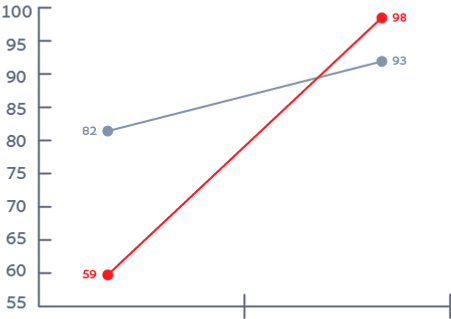
Research Group
(the Accelium Method)
Control Group
(standard methods)
The three main conclusions of this research project are:
1. The learning of Accelium strategic and thinking concepts enriches and elaborates children’s language of thinking and considerably enhances their language skills.
2. Children whose participation was limited to the playing of mind games, tended to improve their language of thinking, albeit to a lesser extent than those children who took part in the Accelium post-game reflective discussion.
3. The Accelium Method is especially effective among children with weak scholastic achievements. Professor Green metaphorically referred to the Accelium Method as one that "uncovers 'diamonds in the rough' and then polishes them".helps them grow."

“On the basis of these results, I strongly urge the continuation and development of this line of experiments. The question of how to improve strategic reasoning abilities has all but escaped rigorous scientific attention, and this research project promises to make important and useful contributions to knowledge.
Findings of the studies to date demonstrate a strong positive influence exerted by the Accelium Method on children’s scholastic achievements in general, and particularly in the fields of mathematical and language skills. Additional research projects are planned for the coming years in an effort to further evaluate and augment the Accelium Method.”Professor Donald Green, Columbia University (Formerly Yale), USA
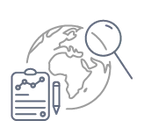
International Research
The academic and motivational effects of the Accelium Method have been studied by prominent universities and research institutes worldwide.
Main Findings
Research Institute
Year of research
Primary school students who took part in an Accelium course developed their “Language of Thinking”, which is conductive to knowledge transfer and application of abstract strategic concepts.
University of Nothumbria

1999-2003
Participating in Accelium coursed significantly improved 3rd grade students performance in both math and language arts standardized tests.
University of Yale

2002-2004
5th graders who took part in Accelium Method courses improved their standardized proficiency rating results in Portuguese, Mathematics and Natural Sciences. Participating teachers consistently reported a positive impact of the Methodology on their personal development.
INADE institute, Brazil

2009-2014
Participating students improved their emotional, cognitive and ethical skills. Most students reported they felt better equipped to confront new problems. Teachers reported they feel an improvement in students’ creative thinking and communication skills.
University of Istanbul

2013-2014
2nd and 4th graders who took Accelium Method courses demonstrated grater control of impulses in problem solving scenarios, resulting in more proactive, thought out and well- articulated solutions.
Sapienza of Rome

2014-2016
Game-Based Learning At Any Time and Any
Place
Learn about the Accelium Technology

Game-Based Learning At Any Time and Any
Place

Learn about the Accelium
Technology

Accelium Group © 2026. All rights reserved.
JOIN NEWSLETTER
Privacy policy
Accelium Group © 2026. All rights reserved.
JOIN NEWSLETTER

